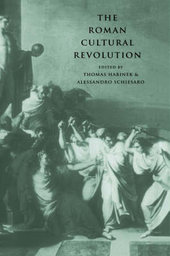
|
The Roman Cultural Revolution
Hardback
Main Details
| Title |
The Roman Cultural Revolution
|
| Authors and Contributors |
Edited by Thomas Habinek
|
|
Edited by Alessandro Schiesaro
|
| Physical Properties |
| Format:Hardback | | Pages:264 | | Dimensions(mm): Height 240,Width 163 |
|
| Category/Genre | Literary studies - classical, early and medieval
World history - BCE to c 500 CE |
|---|
| ISBN/Barcode |
9780521580922
|
| Classifications | Dewey:937 |
|---|
| Audience | | Professional & Vocational | |
|---|
| Illustrations |
12 Halftones, unspecified
|
|
Publishing Details |
| Publisher |
Cambridge University Press
|
| Imprint |
Cambridge University Press
|
| Publication Date |
4 December 1997 |
| Publication Country |
United Kingdom
|
Description
This book places culture centre-stage in the investigation of the transformation of Rome from Republic to Empire. It is the first book to attempt to understand the so-called Roman Revolution as a cultural phenomenon. Instead of regarding cultural changes as dependent on political developments, the essays consider literary, artistic, and political changes as manifestations of a basic transformation of Roman culture. In Part I the international group of contributors discusses the changes in the cultural systems under the topics of authority, gender and sexuality, status and space in the city of Rome, and in Part II through specific texts and artifacts as they refract social, political, and economic changes. The essays draw on the latest methods in literary and cultural work to present a holistic approach to the Augustan Cultural Revolution.
Reviews"Unquestionably the volume will be influential in the effort to bring cultural studies into the classical fold. The editors and participants have made laudable efforts to reverse assumptions that cultural artifacts are products of socio-political circumstances." Katherine O. Eldred, Bryn Mawr Classical Review "The Roman Cultural Revolution, unlike many collections, is consistent in its excellence and thematic presentation on a most important topic. Recommended for all libraries." Timothy S. Johnson, Religious Studies Review
|